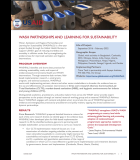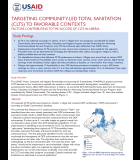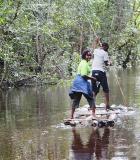Rebuilding Basic Health Services (RBHS)
The project started in 2008 with a focus on improving health service delivery in the counties of Bong, Nimba, Lofa, River Gee and Grand Cape Mount. In 2011, RBHS shifted from its original focus to capacity building of the MOHSW and County Health Teams in Bong, Lofa and Nimba counties. Adhering to the National Health Policy and guided by the WHO Health Systems Strengthening Conceptual Framework, the project worked to develop or strengthen six “building blocks:” health services, workforce, finance, access to drugs and supplies, information management and governance and leadership. A major objective of this second phase was to transfer management of performance-based contracts from the project to the MOHSW. The strengthening of community health structures and systems, community health workers, and Community Health Development Committees (CHDCs) was also a major aim.
Activity Description
Adhering to the 2011‐2021 National Health and Social Welfare Policy and Plan (NHSWPP), the revised project design was developed around the six building blocks of health systems strengthening developed by WHO:
- delivering essential health services,
- the health workforce,
- health information systems,
- access to essential medicines,
- health systems financing and
- governance and leadership.
For this second phase of the project, there were two main intermediate results:
- Increased access to basic health services through improved provision of quality health services and adoption of positive health behaviors; and
- Increased quality of health services through improving infrastructure, health workforce and systems performance by enhancing capacity to plan, manage and monitor a decentralized health system.
To support the central and county plans, RBHS utilized several capacity-building approaches including:
- Technical assistance from international and national partner staff and consultants to develop policies, guidelines, training programs and software
- Training of central and county-level trainers and use of cascaded training modes
- Exposure trips to countries in Africa, e.g., Ghana for health financing
- Embedded staff to provide technical assistance and to mentor in the use of organizational systems developed (e.g., HMIS or LMIS)
- Exchange trips within the country
- Facility renovations and provision of material aid
Expected Outcomes
- Increased utilization of quality services, and more responsive services through effective health system decentralization.
- More responsive services through effective health system decentralization
Actual Outcomes
- Surveys from post-evaluation show that services to be more responsive, and attribute this to improved systems, facilities, services and practices developed with assistance from RBHS.
- Facility-based deliveries rose in the facilities supported in the three counties from under 20 percent in July 2009 to 66 percent utilization reported in the July 2013-June 2014 report.
- Facility service data is now entered in all fifteen counties using the new DHIS 2.4 software, which has improved responsiveness of services.





